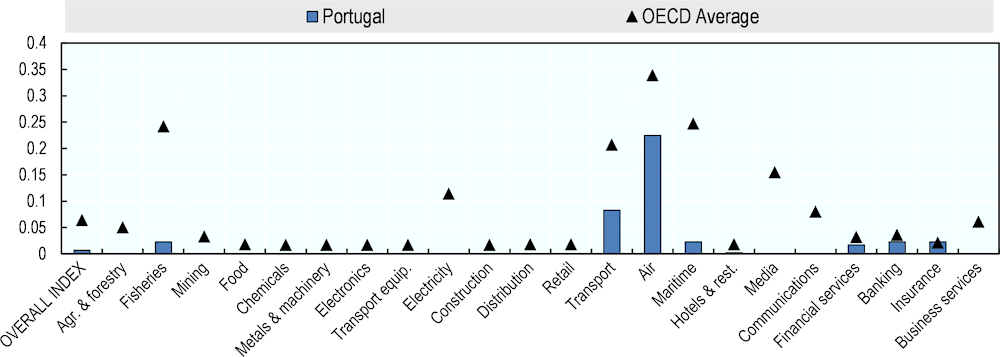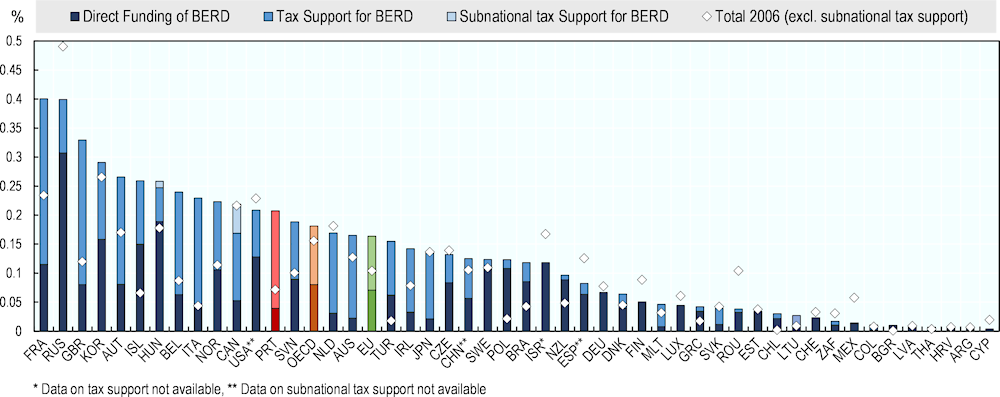This chapter reviews the mix of policies in place for fostering FDI spillovers on the productivity and innovation of Portuguese SMEs. It identifies the FDI-SME diffusion channels and enabling factors that are effectively supported by Portugal’s policy framework, and the policy instruments used to promote FDI-SME linkages, noting areas for further policy development or a shift in the policy mix. It also conducts an assessment of various aspects of regulation impacting the diffusion of knowledge from foreign to domestic firms, focusing on investment and trade openness, competition and labour market regulations.
Strengthening FDI and SME Linkages in Portugal

5. The policy mix for FDI diffusion on Portuguese SMEs
Abstract
5.1. Summary of findings and recommendations
The quality of the legal and regulatory environment can determine whether a country can attract productivity-enhancing and innovation-oriented FDI, and whether spillovers on domestic SMEs can occur. A number of more targeted policies at the intersection of investment, SME and entrepreneurship, innovation and regional development areas can also further boost FDI-driven knowledge diffusion and its impact on domestic economies. These laws, regulations and policy initiatives cannot be considered in silos but in the framework of an adequate and coherent policy mix. The main challenge for governments is ensuring that the policy mix is aligned with the country’s economic structure, policy priorities, and economic geography.
This chapter reviews the policy mix for FDI spillovers on Portuguese SMEs and identifies areas in which it can be strengthened (Table 5.1). Based on an assessment of 72 policy initiatives, it identifies the main FDI-SME diffusion channels and enabling factors that are supported by Portugal’s policy framework, and draws comparisons with and examples from other EU countries, in particular Ireland and Lithuania, which offer significant opportunities for mutual learning. These comparisons are complemented with a discussion on Portugal’s strategic policy priority to support the internationalisation of SMEs and use FDI as an important channel for improving the productivity and innovation of the domestic economy.
Table 5.1. Findings and recommendations on Portugal’s policy mix for FDI-SME diffusion
|
Findings |
Recommendations |
|---|---|
|
Enabling conditions for FDI diffusion on Portuguese SMEs |
|
|
Portugal has one of the most open FDI market access regimes in the OECD area. FDI promotion policies exhibit a consistent targeting of innovative and knowledge-intensive activities and include mainly regulatory and financial incentives. |
Avoid potential inconsistencies and redundancies arising from operating too many regulatory incentives at too small a scale. |
|
Structure FDI promotion policies into clearly articulated support packages that are sufficiently differentiated to target different types of FDI (e.g. large investors, start-ups, R&D, etc.) |
|
|
Public financial support to R&D and business innovation is above the OECD average and on par with top innovators such as the USA and Canada. |
Re-balance the policy mix towards skills upgrading programmes that could help SMEs access qualified human capital. |
|
A large number of publicly supported credit lines and co-investment programmes are in place to facilitate SME access to finance. However, inefficiencies in the judicial system, deficiencies in collateral and bankruptcy laws and the balance sheet constraints of Portuguese banks create tight SME lending conditions. |
Address the vulnerabilities of the banking sector in order to free up capital for new lending to SMEs. |
|
Remove bottlenecks in judicial efficiency so that banks can enforce collateral without going through long court proceedings. |
|
|
Leverage the new National Promotional Bank to promote access to equity capital and alternative financing instruments for SMEs. |
|
|
The availability and quality of the knowledge transfer infrastructure has improved (e.g. Collaborative Laboratories), however regional disparities are observed in SME support services. |
Expand the presence of knowledge transfer organisations to less developed regions, and ensure that they have adequate financial and human resources to implement SME support activities. |
|
FDI-SME diffusion channels |
|
|
Portugal has a comprehensive set of policies (e.g. Suppliers Clubs, matchmaking platforms, collaborative R&D incentives, Internationalisation Academy, etc.) to foster FDI-SME linkages and strategic partnerships. |
Expand the Suppliers Clubs to additional sectors of strategic importance for the Portuguese economy. Assess whether SMEs continue to benefit from supply chain linkages with foreign affiliates after public support is phased out. |
|
The scope of incentives for R&D collaborations is often limited to collaborations between domestic actors only. |
Prioritise the selection of innovative foreign affiliates in the collaborative R&D incentive schemes administered by ANI. |
|
Stringent employment protection regulations may hinder labour mobility from foreign to domestic firms in sectors and regions with low absorptive capacities. |
Reform labour market rules to reduce hiring costs for SMEs and enable them to retain and attract highly skilled workers. |
|
A limited number of targeted policies is in place to foster greater labour mobility from foreign MNEs to the domestic entrepreneurial ecosystem (e.g. INOV Contacto, Tech Visa). |
Build on the success of the INOV Contacto programme and broaden the range of policies available to encourage labour mobility (e.g. corporate spin-outs, payroll tax incentives for highly skilled workers, employee exchange programmes, etc.). |
|
Regulatory barriers to competition are on par with the OECD average. However, the competition channel may be hindered by barriers to entry and conduct restraints in professional services and retail trade. |
Ease entry and conduct requirements for certain professional services and retail trade, to improve competition and ensure a level playing field for foreign and domestic firms. |
5.2. Overall balance of the policy mix for FDI diffusion on domestic SMEs
Strengthening SME absorptive capacities and encouraging strategic partnerships appear to be the main objectives pursued by Portugal
In Portugal, FDI spillovers on domestic SMEs are supported by a variety of policy initiatives that are designed and implemented by government agencies, Ministry departments, inter-institutional committees and Task Forces responsible for the coordination of national strategies. The policy mix relies mostly on measures that aim to strengthen the broader enabling environment for FDI-SME diffusion rather than the direct channels through which productivity and innovation spillovers occur (Figure 5.1)1. More than 60% of the policy initiatives assessed for the purpose of this study target the absorptive capacity of local SMEs through measures that aim to upgrade entrepreneurial skills, support SME innovation and facilitate the acquisition of new technologies. A large number of policy initiatives (31%) also targets the attraction of FDI into productivity-enhancing and R&D-intensive activities, while a few initiatives (15%) are in place to promote agglomeration effects by exploiting the potential of spatial and network linkages as sources of productivity and innovation for Portuguese regions (i.e. economic geography factors).
Targeted public action is also undertaken to strengthen FDI-SME diffusion channels, although not all channels are supported to the same extent. Value chain linkages (26%) and strategic partnerships (36%) are supported through financial incentives for R&D and technology collaboration, matchmaking services bringing together foreign investors with Portuguese SMEs, as well as supplier development programmes aimed at supporting the internationalisation of small firms. In contrast, a small number of policy initiatives (14%) is in place to promote competition and knowledge exchange between foreign and domestic firms, and little is done to facilitate the mobility of skilled workers in the domestic labour market (3%).
Figure 5.1. Portuguese policies and the FDI-SME diffusion channels and factors they act upon

Source: EU/OECD Survey on Policies enabling FDI spillovers to domestic SMEs (2021).
Preliminary findings from the OECD/EU Survey on Policies enabling FDI-SME linkages and productivity and innovation spillovers to domestic SMEs show that Portugal’s policy mix does not substantially diverge from other EU countries with similar economic and market conditions. Policies targeting SME absorptive capacities tend to dominate the policy mix of EU Member States, while the labour mobility and competition channels receive less attention from policymakers.
Nevertheless, the Portuguese policy mix does reflect differences in policy priorities and institutional arrangements. When compared to Ireland and Lithuania, two countries with open economies driven in large part by foreign investors and EU membership, Portugal appears to implement a wider range of policy initiatives to promote FDI-SME linkages and strategic partnerships. This can be partly due to AICEP’s dual mandate to attract FDI and support the internationalisation of Portuguese firms, which allows for greater alignment of resources and synergies between the two very distinct work-streams – i.e. the aftercare services provided to foreign investors and the supplier development programmes targeting domestic firms. In fact, merging inward investment promotion and trade promotion into a single agency is a common practice among OECD governments, with 56% of OECD IPAs being responsible also for activities that support the internationalisation of their domestic economies (OECD, 2018[1]). IDA Ireland and Invest Lithuania, the Irish and Lithuanian investment promotion agency (IPA) respectively, are notable exceptions to this trend as they focus on investment promotion only.
Differences in the policy mix are also observed regarding productivity-enhancing FDI and the consideration of economic geography factors in policymaking. As outlined in the following sections, IDA Ireland promotes a more diverse range of policies than AICEP to attract and facilitate productivity-enhancing investment, including by targeting small multinationals and giving them access to SME support instruments implemented by Enterprise Ireland, the Irish SME agency. Regarding economic geography factors, Portugal has placed particular emphasis on attenuating regional disparities through targeted territorial enhancement measures, regional smart specialisation strategies, and action plans tailored to the economic and market specificities of less developed regions. Considerable policy attention has also gone into strengthening agglomeration economies through the recognition of industrial clusters and the provision of technical and financial support to promote the internationalisation of local entrepreneurial ecosystems.
Financial support schemes dominate the policy mix, followed by technical assistance, information and facilitation services
Policies that aim to strengthen FDI spillovers on SMEs can involve various types of support (e.g. financial support, regulatory incentives, technical assistance, facilitation services, governance frameworks), reflecting the plethora of strategic objectives they may seek to fulfil as well as the many pathways to achieving policy outcomes (Box 5.1). Achieving coherence and balance in the mix of policy instruments is an important goal.
The Portuguese government relies mainly on financial incentives and to a lesser extent on other measures to strengthen FDI spillovers on domestic firms (Figure 5.2). Significant variation is, however, observed in the type of support used to achieve different policy objectives (Figure 5.3). Whereas most of Portuguese policies supporting the absorptive capacity of domestic SMEs make use of financial instruments (e.g. grants for SME innovation, R&D tax credits), the attraction of knowledge-intensive FDI is pursued primarily through regulatory incentives (e.g. fast-track licensing regimes). Similarly, technical assistance, information and facilitation services are usually offered to promote value chain linkages and strategic partnerships. Many of these policies provide additional support for economic activities that involve business-to-business (B2B) and science-to-business (S2B) collaboration, reflecting the importance that the national policy system ascribes to the role of networks in creating, accessing and sharing new knowledge. Linked to the role of networks is the availability and efficiency of the country’s knowledge transfer infrastructure (e.g. networking facilities, technology transfer offices, science and technology parks) which has been significantly improved to allow foreign affiliates, SMEs and domestic R&D institutions to collaborate on the development of new products and services.
Box 5.1. The policy mix for FDI-driven productivity and innovation diffusion on domestic SMEs: a typology of policy instruments
The policy mix concept refers to the set of policy rationales, arrangements and instruments implemented to deliver one or several policy goals, as well as the interactions that can possibly take place between these elements (Meissner and Kergroach, 2019[2]). Many of the policies that strengthen the diffusion of knowledge and technology from FDI to domestic SMEs are implemented by multiple institutions and belong to different policy domains (e.g. innovation, investment, entrepreneurship, science and technology, regional development). These “policy systems” can support the channels through which FDI spillovers occur (i.e. value chain relationships, labour mobility, competition and imitation) or the enabling factors that affect their magnitude (i.e. FDI characteristics, SME absorptive capacity, economic geography). A policy initiative can, however, act upon several channels and enabling factors and make use of various policy instruments, reflecting the plethora of policy goals it may seek to achieve as well as the many pathways to achieving productivity and innovation diffusion from foreign firms to local SMEs.
An analysis of the policy mix for FDI-SME diffusion goes beyond the characteristics of policy formulation and implementation, and focuses more on the areas where the different policy mix components are used in complementary and mutually reinforcing ways to achieve desired outcomes. It places emphasis on questions of completeness, balance and interaction among strategic objectives, policy goals, instruments, sectors and populations targeted, and institutional actors involved. Ideally, the policy mix will take into account interactions among these elements and ensure balanced support to enhance the contribution of FDI to the productivity and innovation of SMEs. Based on the type of instrument used, such policies can be classified into:
Governance frameworks, such as national strategies and action plans that lay out policy priorities and define the framework within which policy action on FDI, SMEs and innovation is organised;
Regulatory standards and incentives, which define the framework within which foreign and domestic firms operate and often use legal rules to encourage or discourage different types of business activities (e.g. lighter administrative and licensing regimes for certain types of investments, local content requirements for foreign firms and labour mobility incentives);
Financial support schemes in direct (e.g. grants, loans) or indirect form (e.g. tax relief) to encourage or discourage certain types of business activities (e.g. investment tax incentives, R&D vouchers, wage subsidies for skilled workers).
Technical assistance, information and facilitation services, which aim to encourage the uptake of knowledge (e.g. skill and supplier development programmes) and facilitate interactions between foreign and domestic firms (e.g. matchmaking services and networking events);
Agglomeration and collaboration networks, which refers to platforms, facilities and infrastructures that enable spatial and network-related knowledge diffusion.
Source: Authors based on (Meissner and Kergroach, 2019[2]).
Figure 5.2. Policy instruments used in Portugal, Ireland and Lithuania to enable FDI-SME diffusion

Source: EU/OECD Survey on Policies enabling FDI spillovers to domestic SMEs (2021).
One of the major factors influencing the current mix of policies is the desire and necessity of Portugal to hasten its transition to a knowledge-based economy. Being a small and open economy on the periphery of the EU, the policy priority of recent governments has been to move the economy towards knowledge-intensive and high-technology sectors. Another factor reflected in the chosen policy mix lies in the availability of the EU Structural and Investment Funds, which have been used since 2014 to finance the government’s policy priorities in the areas of investment, entrepreneurship, innovation and smart specialisation through the Portugal 2020 Partnership Agreement. With the exception of the tax incentive schemes, all other financial instruments available to domestic firms are implemented in the framework of the EU-funded Portugal 2020 Incentive Schemes. This explains the large number of financial support measures that are currently in place to support the innovation and internationalisation of the Portuguese economy.
Portugal’s policy mix also presents a relatively high degree of selectivity, which is driven by the national and regional smart specialisation strategies. Many policies target specific types of firms (e.g. SMEs), priority sectors and value chain activities, as well as specific geographic areas. A more targeted approach is consistent with wider industrial and innovation policy frameworks aimed at smart specialisation, and with current development thought about the role of selective policy interventions in designing industrial policies for sustainable growth. As international competition grows, selective targeting can play an important role in developing critical mass in innovation, knowledge creation and technology-based industrial production, particularly in the case of smaller economies with limited available (financial) resources.
Figure 5.3. Policy instruments used in Portugal to support FDI-SME diffusion channels and enabling factors

Source: EU/OECD Survey on Policies enabling FDI spillovers to domestic SMEs (2021).
Portugal’s market openness may facilitate productivity-enhancing FDI, but certain regulatory restrictions could hinder the competition and labour mobility channels
In addition to targeted measures to encourage knowledge and technology diffusion from FDI to SMEs, the broader regulatory conditions matter for the direction and magnitude of FDI spillovers. Host country factors such as openness to international investment and trade, competition rules that facilitate market entry and exit, and a balanced labour market policy regime can influence the performance and market behaviour of SMEs in downstream sectors that could benefit from the presence of foreign affiliates.
Portugal has one of the most open FDI market access regimes in the OECD area, reflecting its strategic choice to use FDI for productivity growth, job creation and regional development. Regulatory barriers to competition are on par with the OECD average following several reforms in product market regulations that took place in recent years to create a lighter licensing regime and reduce red tape. More could be done, however, to ease certain competition-distorting restrictions in professional services and the retail trade sector, which are faced with considerable barriers to entry and conduct restraints. There is also scope to further improve Portugal’s performance in the area of simplification and evaluation of regulations. The quality of public services and coherence and transparency of regulations are factors that significantly influence competition and the investment climate more broadly. Finally, labour mobility, an important channel through which productivity spillovers from foreign to domestic firms occur, may be also limited in sectors with low SME absorptive capacities as a result of the stringent employment protection regulations that are currently in place. Overly restrictive labour market regulations may have adverse impacts on SMEs’ capacity to retain and attract highly skilled workers as SMEs are often unable to match the wage rates of foreign –typically larger– affiliates (see Chapter 3).
Figure 5.4. Portugal’s performance in key regulatory areas

Note: Data bars pointing left show lower regulatory restrictions than the OECD average, and data bars pointing right show higher restrictions. Source: OECD elaboration based on the FDIRR, STRI, PMR and EPL indices.
The COVID-19 pandemic has led to adjustments in policy design and implementation
The COVID-19 pandemic has forced many governments to take extraordinary measures to limit the impact of the containment measures on their economies. Preliminary findings from the EU/OECD survey on policies enabling FDI diffusion on SMEs show that government institutions involved in investment promotion, SME support, innovation and regional development had to change objectives and re-arrange workstreams, instruments and budgets due to the COVID-19 pandemic. Some digitalised their activities, e.g. by organising site visits, meetings or events online, adopting customer relationship management systems and marketing automation tools (e.g. Lithuania), or launching online platforms for sharing information (e.g. Bulgaria).
Similar trends are observed among the main Portuguese agencies. Most of the assessed FDI-SME diffusion policies have not been impacted by the COVID -19 pandemic but many have been adjusted (Figure 5.5). Among these, half entailed adjustments to the timeframe of their implementation and one third adjustments to their objectives. For certain policies the budget was increased to finance new actions or provide additional financial support to business enterprises, while other programmes were adjusted to target the sectors that were most affected by the containment measures such as tourism, hotels and restaurants, and commercial activities.
Portuguese agencies also had to adjust their workstreams and prioritise new funding schemes. The approval of payments to eligible businesses was prioritised, and in the case of reimbursable financial incentives a deferral period of 12 months was automatically applied. Additional budgets were also allocated to finance public health-related R&D activities and help companies shift their production lines towards goods aimed at combatting the pandemic. Finally, the mode of delivery of certain programmes had to change to accommodate the new market conditions created by the containment measures. Several policies that were previously delivered in person such as skills upgrading programmes for SMEs, matchmaking services and networking events for foreign and domestic firms, had to move online. For instance, AICEP created task forces to respond more quickly to requests from companies operating in the most affected sectors and sectors of significant importance for the Portuguese economy (e.g. agrifood, logistics, health, and construction materials). Several webinars were also organised to inform Portuguese companies about the impact of the Covid-19 pandemic on foreign markets. More than 400 online meetings between companies and AICEP’s overseas offices were organised during the first month of the lockdown.
Figure 5.5. The impact of the Covid-19 pandemic on Portugal’s FDI-SME diffusion policies

Source: EU/OECD Survey on Policies enabling FDI spillovers to domestic SMEs (2021).
5.3. Policies acting upon the enabling environment for FDI diffusion on SMEs
Attracting and facilitating productivity-enhancing FDI
The type of FDI that a country attracts and the extent to which foreign firms create linkages with the local economy depend on the regulatory environment for FDI and the legal framework for market entry and conduct, amongst other factors. Openness to FDI may not only affect productivity in industries that get market access, but also those in downstream sectors that benefit from potentially better access to high quality inputs and services domestically. Targeted regulatory and financial incentives as well as information and facilitation services can also play a crucial role in channelling FDI into more productive and knowledge-intensive activities with higher spillover potential for domestic SMEs.
Portugal has one of the most open economies to foreign investment
According to the OECD FDI Regulatory Restrictiveness (FDIRR) index, Portugal is one of the most open economies in the OECD area and the third most open among OECD EU countries (Figure 5.6). Portuguese law prohibits any market access discrimination based on nationality, and foreign investors enjoy the same conditions and rights as domestic companies with regard to the incorporation of their companies, mergers and acquisitions, taxation, social security contributions, the liability of shareholders and their day-to-day business activities. At the sectoral level, fisheries, transport, the air and maritime sectors, and financial services are the sectors where most restrictions are found; however, these are still significantly lower than the OECD average (Figure 5.7). For instance, government approval is required for foreign and domestic investments in defence, water management, public telecommunications, maritime and air transport. The establishment of a credit institution or insurance undertaking is also subject to authorisation by the Bank of Portugal for EU firms or the Ministry of Finance for non-EU firms (US Department of State, 2020[3]).
An investment screening framework is in place for investments undertaken by companies from outside the EU/EEA that intend to acquire direct or indirect control over strategic assets related to defence, national security, energy, transportation and communication services. Decree-Law No. 138/2014 lays out the screening mechanism, which allows the Portuguese Council of Ministers to oppose acquisitions of strategic assets when these are deemed to threaten national security or the provision of essential services (Government of Portugal, 2014[4]). Since October 2020, the EU FDI Regulation entered into force, which automatically applies to Portugal and broadens the sectoral scope of national screening mechanisms within the EU to include critical infrastructures such as healthcare, media and data processing.
Figure 5.6. Portugal has very few statutory restrictions to foreign investment
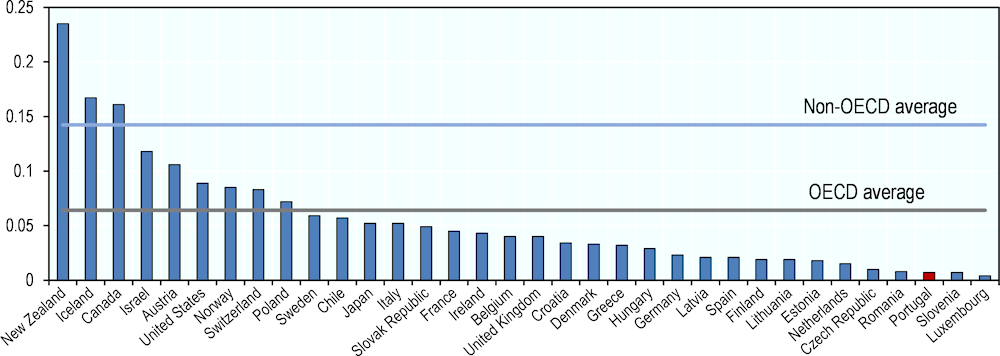
Note: The OECD FDI Regulatory Restrictiveness Index only covers statutory measures discriminating against foreign investors. Source: OECD FDI Regulatory Restrictiveness Index (database), www.oecd.org/investment/fdiindex.htm
Figure 5.7. FDI restrictions are limited to only a handful of sectors
Together with FDI restrictions, other behind-the-border regulations, including barriers to trade, barriers to competition and other discriminatory measures, affect the degree of local embeddedness of foreign affiliates and shape market access conditions in downstream sectors that could benefit from their presence. Given the important role that services play for Portugal’s position in GVCs and its upgrading potential, examining non-FDI market access conditions in the services sector could provide a better understanding of the potential for FDI-SME diffusion in a large part of the domestic economy.
According to the OECD Services Trade Restrictiveness Index (STRI), Portugal has one of the most favourable regulatory environments for services trade in the OECD area, with lower than the average STRI score in 18 out of 22 services sectors in 2020 (Figure 5.8). While in certain sectors such as engineering services, the STRI of Portugal increased significantly between 2014 and 2016 due to a tightening of the rules concerning the licence to practice, steps towards greater openness to services trade were recorded in several other sectors in recent years. Higher than average restrictions are found only in legal, accounting, architecture and engineering services. This is largely due to behind-the-border regulation in the form of tight immigration policies and other restrictions on the movement of people and foreign entry. For instance, commercial presence and citizenship of an EEA country or a country that has signed a reciprocal agreement with Portugal is required to practice engineering and architecture services. For accounting services, at least 51% of the equity shares must be held by licensed accountants, while statutory auditors must own at least 51% of the equity shares of an audit firm (OECD, 2019[5]).
Regulatory and financial incentives are the main policy instruments used to attract foreign investment into productivity-enhancing and R&D-intensive activities
Portugal’s strong performance on FDI and trade openness reflects the country’s strategic policy priority to improve economic conditions by keeping markets open for Portuguese and foreign firms and attracting FDI that contributes to productivity growth. In recent years, the internationalisation of the economy has become a major policy priority for the Portuguese government (Table 5.2). A national Internationalisation Programme (Programa Internacionalizar) was launched in 2017, outlining areas where public action is needed with the aim to increase FDI inflows and enable more Portuguese companies to expand, export and invest abroad. The programme was updated in 2020 (Programa Internacionalizar 2030) to reflect the government’s policy priorities for the next decade and take into account the impact of the Covid-19 pandemic on the economy. Efforts have been also made to mobilise FDI from foreign firms that are part of the Portuguese diaspora. The National Diaspora Investment Support Programme (PNAID) was approved in 2020 and a specialised Diaspora Investor Support Office (Gabinete de Apoio ao Investidor da Diáspora) operates within the Ministry of Foreign Affairs to support investments of Portuguese communities and companies located abroad.
Figure 5.8. Portugal’s overall STRI score is in line with the OECD average
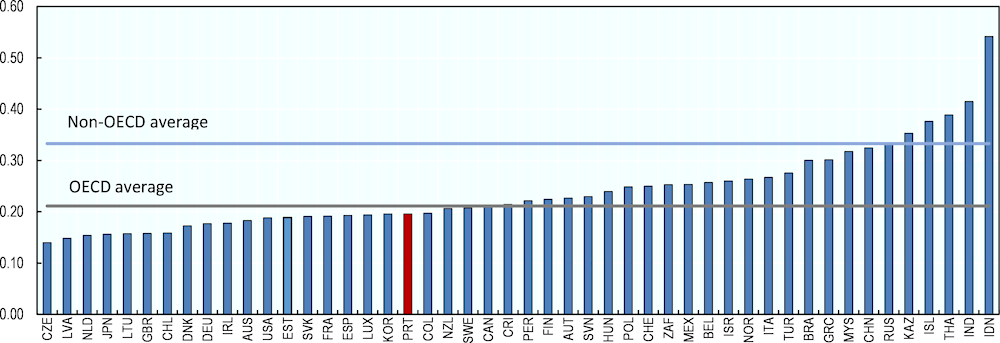
Note: The OECD STRI indices take values between zero and one, one being the most restrictive. The STRI database records measures on a Most Favoured Nations basis. Preferential trade agreements are not taken into account. Air transport and road freight cover only commercial establishment (with accompanying movement of people). The indices are based on laws and regulations in force on 31 October 2019.
Source: OECD STRI database, 2020.
Overall, Portugal exhibits a consistent targeting of innovative and knowledge-intensive activities across all the FDI promotion policies assessed for the purpose of this study. The policy mix for the attraction of knowledge-intensive FDI relies heavily on regulatory incentives (Figure 5.9). The government has introduced four special investment regulatory regimes for different types of investments, including large-scale projects, investments in less developed regions, as well as diaspora investments. These regulatory schemes allow investors to benefit from simplified and expedited licensing and administrative procedures – and in the case of diaspora investments financial support – under certain conditions. These include, amongst others, the requirement to introduce technological processes in cooperation with domestic R&D institutions and to demonstrate the potential for spillover effects on Portuguese SMEs.
Investing in R&D and innovation activities is also one of the eligibility criteria for the granting of business investor visas. In order to encourage different types of entrepreneurs to establish their operations in the Portuguese market, the government operates two residence-by-investment schemes, which allow individuals to obtain residence rights through investments in certain sectors and types of assets. The recently launched Startup Visa programme is addressed to innovative start-ups while the Residence Permit for Investment (ARI) scheme targets large investors. Several tax incentives are also available to foreign investors – however these also apply to domestic firms on equal terms. Apart from the SIFIDE II scheme, which has been the main instrument used by government to support business R&D for both domestic and foreign firms, a set of contractual tax benefits apply to large investments that promote technological innovation and attenuate regional disparities.
Recent government efforts to tap into the spillover potential of different types of FDI and pursue broader developmental objectives by diversifying the support available to foreign investors are a step in the right direction. Moving forward with the implementation of these measures, it will be important to avoid potential inconsistencies and redundancies arising from operating too many regulatory schemes at too small a scale and in different parts of government (e.g. AICEP, IAPMEI, Ministry of Economy and Digital Transition, Ministry of Foreign Affairs). Greater coordination among the relevant actors, better communication of the available public support, and clarity about how different policies can meet the needs of different types of investors could ensure policy coherence and improve the uptake of recently introduced measures.
Figure 5.9. Policy instruments for productivity-enhancing and knowledge-intensive FDI
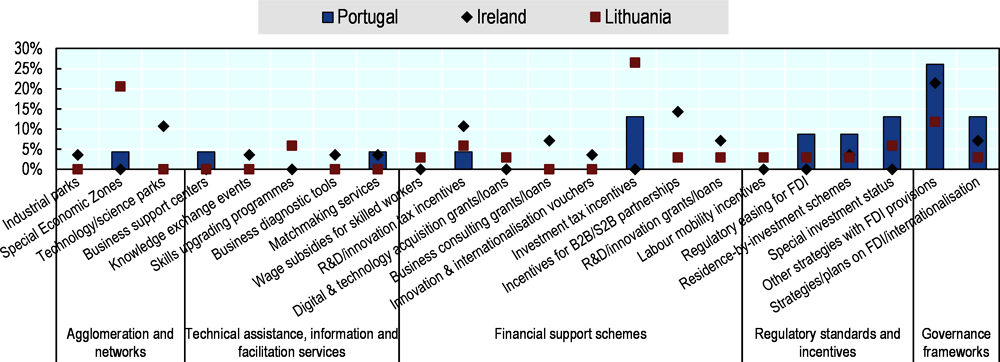
Source: EU/OECD Survey on Policies enabling FDI spillovers to domestic SMEs (2021).
Ultimately, regulatory incentives (e.g. PIN and PII status, Diaspora Investor status, ARI scheme, Startup Visa programme) will have to be structured into clearly articulated packages of support that also combine financial support (e.g. Portugal 2020 grants, SIFIDE II) and technical assistance (e.g. access to networks and clusters) and are sufficiently differentiated to target a variety of foreign firms and investment projects. For instance, Lithuania recently launched the “Green Corridor for Large-Scale Investment Projects” initiative, which provides a comprehensive package of support to large investments of national significance, including tax incentives, grants, fast-track licensing procedures, access to dedicated land plots, streamlined migration processes for foreign employees, and training programmes tailored to the needs of large-scale investors. IDA Ireland has partnered with Enterprise Ireland, the Irish SME agency, to provide a package of technical and financial support for small foreign-owned multinational companies to help them grow and expand their R&D activities in the Irish market.
Further exploiting the potential of small high-growth multinational companies that often drive job creation and innovation in knowledge-intensive sectors is an area that Portugal could prioritise. These innovative firms have different needs from large investors that cannot be addressed solely through regulatory incentives. The uptake of the Startup Visa programme, which grew from 34 recipients in 2018 to 89 in 2020, demonstrates the great potential that innovative startups present for the Portuguese market. AICEP and IAPMEI could further leverage their respective expertise on investment promotion and SME development to create a distinct support package for small high-growth companies, and ensure that these firms are aware of and have access to the SME support services provided by the Portugal 2020 Incentives Schemes.
Table 5.2. Main policies for productivity-enhancing and knowledge-intensive FDI
|
Main policies |
Description |
Implementing institution |
|---|---|---|
|
National Diaspora Investment Support Programme |
The programme aims to take advantage of the potential of Portuguese communities living abroad to support the internationalisation of the economy through diaspora investments. |
Ministry of Foreign Affairs |
|
Investment Monitoring System |
The Permanent Investor Support Commission is responsible for monitoring and facilitating investment projects of both domestic and foreign firms that fulfil certain criteria, including producing innovative and tradable goods and services, and having spillover effects on Portuguese SMEs. The monitoring regime streamlines all administrative and licensing procedures as well as procedures for granting financial incentives. |
Permanent Investor Support Commission |
|
Investment of Potential National Interest (PIN) Status and Investment for the Interior (PII) Status |
The PIN status is granted to projects of more than 25 million euro that create 50 or more jobs, while the PII status is granted to projects of more than 10 million euro that create at least 25 jobs and take place in Portugal’s interior areas. Projects granted the PIN and PII status benefit from a priority assessment and simplification of licensing and administrative procedures. Projects that do not fulfil the conditions can still benefit if they undertake R&D and innovation activities, are export-oriented and produce tradable goods/services. |
Permanent Investor Support Commission |
|
Diaspora Investor Status |
The Diaspora Investor Status is granted to members of the Portuguese diaspora who undertake an investment project in Portugal either individually or through a company. The status gives access to a set of financial incentives with additional benefits if the investment project is located in the interior of the country. |
Ministry of Foreign Affairs |
|
Residence Permit for Investment (ARI) |
The Residence Permit for Investment Activity (ARI) enables third country nationals to obtain a temporary residence permit to conduct business in Portugal. There is a minimum amount that should be invested, which ranges depending on the type of activities involved, including investing in research activities conducted by Portuguese public or private R&D entities. |
Foreigners and Borders Service |
|
Startup Visa |
The Startup Visa programme targets entrepreneurs from outside the EU’s Schengen Zone who already own or consider launching a startup, but aim to set it up in Portugal. For the visa to be granted, solid business and financial plans are required demonstrating that the startup will undertake innovative activities and contribute to job creation. |
IAPMEI |
|
Contractual Tax Benefits for Productive Investment |
The Contractual Tax Benefits for Productive Investment apply to investments of at least 3 million euro that take place in specific sectors (e.g. manufacturing, accommodation, filmmaking, computer programming, business services, R&D activities) and are deemed of strategic importance for the national economy, the reduction of regional disparities and the promotion of technological innovation. |
Investment Tax Incentive Coordination Council |
|
Tax Regime for Investment Support (RFAI) |
The RFAI includes several tax benefits upon income and real estate taxes for investments in the extractive and manufacturing sectors, tourism, IT services and technologies, shared services centres as well as defence, energy and telecommunications. |
Tax Authority |
|
SIFIDE II |
SIFIDE II has been the main instrument used by government to support business R&D since its establishment in 1997. SIFIDE consists of a credit against the corporate tax liability for expenditures incurred on R&D activities. |
ANI |
|
Diaspora Investor Support Office (GAID) |
The Diaspora Investor Support Office is a facilitation platform aimed at supporting micro and small investment projects from Portuguese diaspora communities. |
Ministry of Foreign Affairs |
Source: EU/OECD Survey on Policies enabling FDI spillovers to domestic SMEs (2021).
Strengthening the absorptive capacity of Portuguese SMEs
Policies targeting the absorptive capacity of local SMEs can take many forms (e.g. subsidies, grants, loans, tax relief, infrastructures, training programmes) and target various aspects of SME performance (e.g. access to innovation assets, access to skills, access to finance).
In Portugal, SME absorptive capacities are supported primarily through financial incentives and technical assistance programmes (Figure 5.10). Policy targeting of SMEs is also very common. More than 58% of the policies assessed for the purpose of this study target Portuguese SMEs only or provide some sort of preferential treatment to them in the form of additional financial support, more lax requirements and conditionalities, and prioritisation in their selection as recipients of public support (Figure 5.11). The significant targeting of SMEs observed in the current policy mix reflects to a large extent the strategic choice of the Portuguese government to mainstream SME issues into national development frameworks.
Non-corporate entities such as research centres, higher education institutions and technology transfer offices are also involved in several programmes. Portuguese policymakers increasingly recognise the role that these institutions can play in bridging the gap between science and industry, creating new knowledge and facilitating the commercialisation of R&D. Non-corporate entities are mostly involved in policies of collaborative nature that are implemented by ANI and focus on R&D and innovation activities. On the other hand, very few initiatives apply exclusively to foreign firms. Most policies (61%) are open to all firms irrespective of their origin while several programmes supporting SME absorptive capacities naturally target domestic firms only (33%).
Figure 5.10. Policy instruments for SME absorptive capacities in Portugal
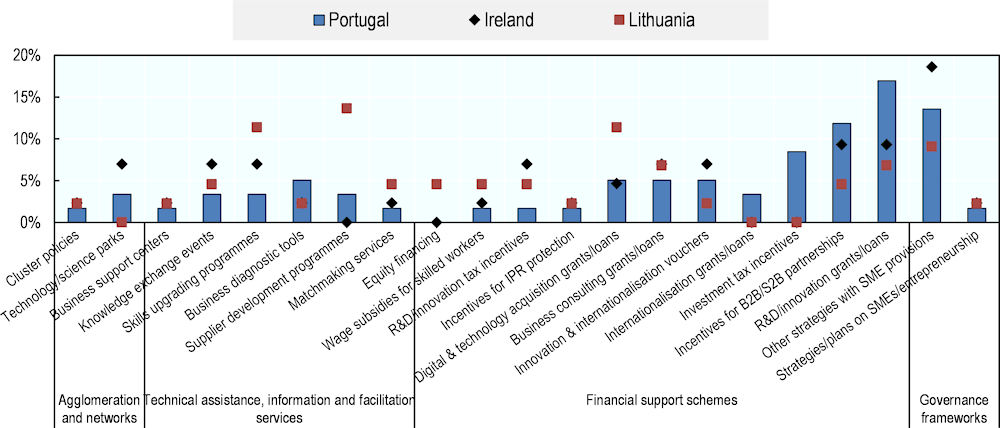
Source: EU/OECD Survey on Policies enabling FDI spillovers to domestic SMEs (2021).
Figure 5.11. Policies targeting SMEs versus generic policies
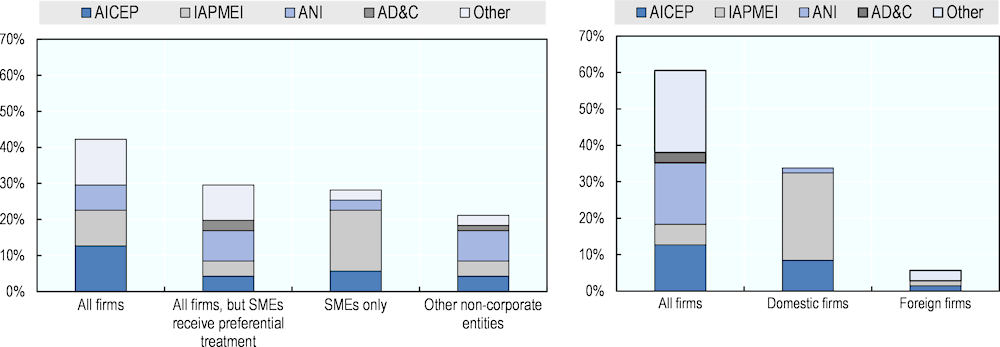
Source: EU/OECD Survey on Policies enabling FDI spillovers to domestic SMEs (2021).
The policy mix for business research and innovation relies on financial incentives
Governments worldwide increasingly rely on direct and indirect financial support measures to promote business R&D and encourage innovation, in particular among SMEs. According to the OECD R&D tax incentives database, in 2018, Portugal was placed above the OECD and EU average in terms of total government support to business R&D (BERD), at a rate equivalent to 0.21% of GDP (Figure 5.12) – on par with top innovators such as the US and Canada.
Direct funding in the form of grants and loans represents only a limited share of the total government expenditure. The Tax Incentives System for Research and Business Development (SIFIDE II) has instead been the main instrument used by the Portuguese government to support business innovation since its establishment in 1997. In 2018, the tax scheme accounted for 81% of total public support for R&D (OECD, 2020[6]). The increasing reliance on fiscal incentives rather than direct funding is consistent with trends in other developed economies. Across the OECD area, tax support represented around 56% of total government support of business R&D in 2018 compared to 36% in 2006. The shift in the policy mix has been more pronounced among EU Member States, with tax support doubling from 26% of total government support in 2006 to 57% in 2018.
Figure 5.12. Direct government funding and tax support for business R&D
Direct support measures for SME research and innovation activities are administered through the Business Investment Incentive Schemes of the Portugal 2020 strategic framework, which lays out the policy priorities that govern the use of the EU Structural and Investment Funds for the period 2014-2020. The Competitiveness and Internationalisation (COMPETE 2020) Operational Programme and the Regional Operational Programmes are responsible for allocating grants and loans to domestic firms through three sets of financial instruments; namely incentives for business innovation and entrepreneurship, which aim to support investments in productive innovation and creative entrepreneurship; incentives for the qualification and internationalisation of SMEs, which aim to strengthen the competitiveness of SMEs and their expansion to global markets; and incentives for research and technological development, which aim to increase business investment in technological R&D.
Other initiatives called collective actions (Sistema de apoio a ações coletivas) as well as scientific and technological research projects (Sistema de apoio à investigação científica e tecnológica) provide financial support to non-corporate actors such as universities and research centers to strengthen knowledge transfers. The most important strategic documents guiding the allocation of funds under the COMPETE 2020 and Regional Operational Programmes are the national and regional smart specialisation strategies. The alignment with these strategies is mandatory in the implementation of Portugal 2020 investments in research and innovation and a priority in other areas, such as the support to SME competitiveness.
Portuguese SMEs make up the majority of recipients of both direct and indirect financial support schemes. The number of the SIFIDE II recipients has steadily increased over the past decade from around 400 recipients in 2006 to close to 2000 in 2019. Most of this increase is attributable to SMEs, which accounted for more than 81% of R&D tax relief recipients and 46% of the total allocated tax support over the period 2006-2019 (Figure 5.13). Similarly, SMEs accounted for more than 73% of the total number of enterprises that benefitted from the Portugal 2020 Research and Technological Development funds over the period 2014-2020.
Figure 5.13. Direct and indirect financial support allocated to SMEs for business research and innovation activities
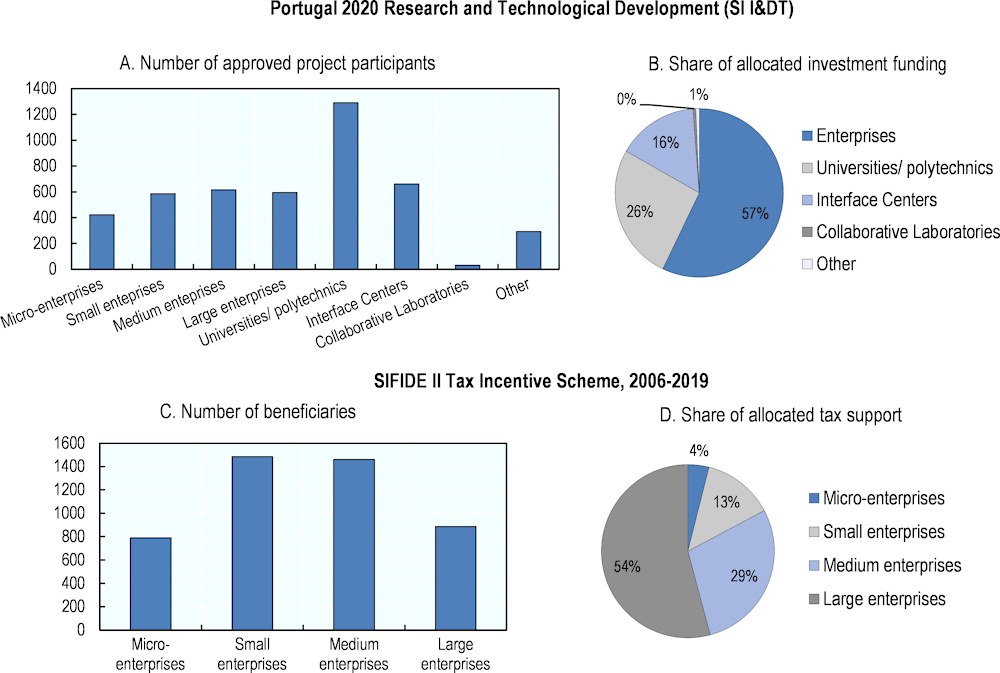
Source: ANI Activity Indicators, accessed on 23 May 2021.
Efforts to remove bottlenecks in judicial efficiency and strengthen financial stability should continue in order to improve SME access to finance
For many SMEs, the high fixed costs of establishing a distribution network and adjusting their products for overseas standards, often require external finance. Well-functioning financial markets can strengthen the absorptive capacity of domestic SMEs by providing the liquidity that they need to develop new products and invest in technology upgrading (Farole and Winkler, 2014[7]).
The ease of getting credit is an area where Portugal ranks worst according to the EU’s Small Business Act (SBA) 2019 performance assessment, reflecting deficiencies in credit reporting systems and collateral and bankruptcy laws (European Commission, 2019[8]). The willingness of banks to provide a loan and the rate of rejected loan applications have deteriorated to below the EU average, while there has been an increase in the average time it takes for a company to get its invoices paid. Over the period 2010-2018, SME lending declined by almost 35% and total business loans dropped by 38% due to the balance sheet constraints of Portuguese banks and a less favourable perception of risk which led to stricter credit standards and tighter lending conditions (OECD, 2020[9]). Overall, the stability of the Portuguese banking sector has steadily improved following the 2008 global financial crisis and the subsequent euro area debt crisis; however banks are still highly exposed to sovereign debt and bank profitability is among the lowest in the EU (OECD, 2021[10]).
Portugal’s underperformance in these areas can be partially attributed to weak contract enforcement procedures because of inefficiencies in the judicial system. According to the EU Justice Scoreboard 2020, Portugal performs poorly with regard to resolving civil and commercial legal cases due to significant bottlenecks in some court districts (European Commission, 2020[11]) (OECD, 2019[12]). Banks should be better able to enforce collateral without going through long and uncertain court proceedings. To address these issues, the Portuguese government has put forward targeted measures through the Programa Capitalizar, which aims to foster the use out-of-court restructuring mechanisms, promote efficient and transparent court proceedings, and establish an early warning mechanism that informs companies of their financial situation. Due consideration on improving judicial efficiency is also given in the recently launched Recovery and Resilience Plan, which focuses on the simplification and modernisation of insolvency procedures and reforms in the operation of Administrative and Tax Courts (Government of Portugal, 2021[13]).
Despite challenges with bank-based SME financing, access to public financial support and the availability of venture capital for new and growing SMEs is well above the EU average, reflecting the large number of publicly supported credit lines and co-investment programmes that the government has introduced as part of the Startup Portugal strategy. The strategy aims to promote alternatives to bank loans such as equity finance, crowdfunding, peer-to-peer lending and co-investment. These financing schemes are channelled to the Portuguese market through several state-owned institutions. A National Promotional Bank (Banco Português de Fomento, BPF), was established in 2020 to support SMEs, midcaps and large companies through targeted funding, equity, guarantees and other hybrid instruments. The participation of IAPMEI, AICEP and Turismo de Portugal in BPF’s corporate governance as shareholders can help further expand credit supply for foreign and domestic firms that want to engage in innovative activities and allow for greater synergies across the investment promotion and SME development policy agendas.
PME Investimentos, a public company regulated by the Bank of Portugal, also serves as a fund-of-funds that facilitates the lending activity of national financial services providers. PME investimentos manages the 200M Fund and the Portugal TECH co-investment fund, which provide venture capital to support innovative projects developed between companies, universities, research centres and incubators. The Capitalizar credit line was also launched by IAPMEI in partnership with PME Investimentos to support SMEs in the adoption of Industry 4.0 solutions (i.e. automation, cloud computing, internet of things) (PME Investimentos, 2018[14]).
The emphasis that the government has placed on strengthening the availability of publicly supported financing instruments is a step in the right direction given the challenges that the Portuguese bank-based financial system has faced over the past decade. The establishment of a National Promotional Bank is expected to play a crucial role in attracting foreign investment and financing innovation. SMEs should be further encouraged to source finance from equity markets and exploit the potential that these new sources of financing can provide. Such an approach should rely on measures that facilitate market-based long-term debt financing, increase the availability of alternative financing, and promote access to equity capital through the stock market. Meanwhile, efforts to reduce the vulnerabilities of the banking sector and free up capital for new lending to SMEs should continue. The 2021 OECD Economic Survey of Portugal stresses the need to further improve financial stability by developing distressed debt markets and introducing new tools to ensure timely recognition of bank losses and debt restructuring (OECD, 2021[10]).
Efforts to address skill shortages in local labour markets should continue
Skill shortages and mismatches undermine the ability of the economy to increase productivity and upgrade into knowledge-intensive sectors. The skills of the local labour force are an important determinant of SME absorptive capacity and can significantly influence the potential for knowledge spillovers from foreign to domestic firms (Farole and Winkler, 2014[7]). Education and skills policies therefore play a crucial role in helping domestic firms meet the requirements of foreign investors.
In Portugal, the strategic objective of improving the skills of the workforce has been mainstreamed in several national strategies that identify new areas of policy action, placing particular emphasis on digital skills. The Digital Transition Action Plan includes a skills workstream, focusing on actions related to formal education, vocational training and digital literacy. Similarly, the National Strategy for Artificial Intelligence 2030 (Estratégia Nacional de Inteligência Artificial) outlines specific objectives and measures with regard to fostering AI skills and digital qualifications. Digital skills have been also addressed through the INCoDe.2030 initiative, which aims to improve digital literacy and the production of new knowledge through the use of digital technologies (Government of Portugal, 2017[15]). Portugal’s Recovery and Resilience Plan, has also prioritised public investments in upgrading the skills of adults and young students and increasing the number of STEM graduates (Government of Portugal, 2021[13]).
IAPMEI implements various training programmes for Portuguese SMEs through its SME Academy, which aims to improve the managerial and organisational skills of employees through vocational training activities and other forms of learning experiences aligned with sectoral needs. A National Mentors Network has been established to support entrepreneurs in the development of their business ideas and projects. In order to address the problems of low educational attainment, the government has also placed particular emphasis on increasing the offer of vocational education and training (VET) opportunities to its workforce (OECD, 2020[16]). Launched in 2017, the Qualifica programme, is the country’s flagship initiative to improve the training and qualifications of adults. During 2018-2020, more than 300 Qualifica centres were established across all Portuguese regions to provide support for the recognition and certification of prior learning acquired in formal and non-formal contexts and to refer adults to education and training pathways, in particular less qualified adults, unemployed people and people not in education, employment or training (NEET).
To address skill shortages a whole-of-government approach is required given the cross-cutting nature of the skills agenda. Linkages with other policy areas should be strengthened to ensure that educational, vocational and training programmes are not implemented in silos but are aligned with Portugal’s national strategies for smart specialisation, innovation and entrepreneurship. The programming of the EU funds for the period 2021-2027 and the launch of new action plans that lay out policy priorities for the next decade offer a great opportunity to raise the effectiveness of related measures and ensure policy coordination between different initiatives and implementing actors. The Portugal Digital Task Force, which was set up to coordinate the implementation of the Action Plan for Digital Transition, can play a key role in coordinating and facilitating synergies between existing and new skills upgrading initiatives. A horizontal alignment of policy priorities and actions will be needed to address skills shortages.
Furthermore, IAPMEI’s SME Academy and AICEP’s Internationalisation Academy could be leveraged to re-balance the policy mix for SME absorptive capacity towards skills upgrading programmes that could help SMEs access qualified human capital. Shifting the focus from financial support schemes to technical assistance and training programmes could address the underlying causes of low absorptive capacities in specific regions and sectors.
Expanding the presence of knowledge transfer infrastructure in Portugal’s least developed regions is crucial to overcome the lack of absorptive capacities of traditional SMEs
Apart from financial support and skills development programmes, the Portuguese government has placed particular emphasis on strengthening the availability of knowledge transfer services and bridging the gap between SMEs and other actors of the Portuguese innovation ecosystem. SME absorptive capacities are influenced strongly by the local knowledge transfer infrastructure, which may include technology transfer offices, applied research centres, universities and other facilities that contribute to the creation and diffusion of knowledge.
The gradual expansion of intermediary organisations over the past decade has led to the establishment of a diverse network of technology transfer offices, R&D centres and science and technology parks. The 2017 Interface Programme provided financial and technical support for the establishment of Technological Interface Centres (CITs) and Collaborative Laboratories (CoLabs). The centres play the role of an innovation broker and, together with SMEs, implement a wide range of technology-oriented projects. Since the launch of the initiative in 2017, there have been 31 entities across Portugal recognised as CITs and 35 entities recognised as Collaborative Laboratories, operating in various thematic areas, including digital technologies, nanotechnologies, production technologies, energy and sustainability, biotechnology, mobility and transport services.
However, there are significant regional disparities in the availability of support services. Most CITs and CoLabs are concentrated in the Norte and Centro regions as well as the coastal areas of Portugal, leaving inland areas and least developed regions without the necessary infrastructure to support SME innovation and business growth. Efforts to expand their presence across Portugal should continue and be coupled with a needs assessment of local business innovation ecosystems. As suggested by the 2019 OECD Higher Education, Research and Innovation Review of Portugal and planned by the Portuguese government in its recently launched Recovery and Resilience Plan, the presence of these intermediary organisations could be further consolidated by ensuring adequate financial and human resources to maintain and expand their networks (OECD, 2019[17]). The government’s commitment to continue supporting CITs and CoLabs will allow them to further consolidate their presence in local entrepreneurial ecosystems and improve their business advisory activities.
Mainstreaming economic geography factors into FDI-SME diffusion policies
Clusters embed characteristics such as industrial specialisation and geographical proximity that make knowledge spillovers more likely to happen. From a policy perspective, this means that FDI attraction policies, SME policies and cluster development policies could go hand in hand to increase the potential of FDI for SME productivity. Moreover, informing investors about the investment potential of regions and improving the local business climate by adapting policies to the economic and market characteristics of local economies could prove effective.
Economic geography considerations have been mainstreamed into key FDI-SME diffusion policy areas
The government of Portugal has made the strategic choice to use FDI promotion and SME support policies to attenuate regional disparities. Economic geography factors are addressed through agglomeration instruments, regulatory and tax incentives as well as several strategic governance frameworks that touch upon regional development issues (Figure 5.14).
The Interior Enhancement Programme was launched in 2018, outlining a set of measures to support the country’s interior territories, which are characterised by weak economic activity and demographic decline. The programme shaped the framework for the establishment of several FDI- and SME-related initiatives, including the PII investment status (described in the previous section) for investments undertaken in Portugal’s interior territories, the Tax Benefits for Portugal’s Interior Areas for SMEs operating in the agricultural, commercial, industrial and services sectors, and the Advanced Internationalisation programme implemented by AICEP for companies located in Portugal’s least developed municipalities. As is the case in other EU Member States, the regional smart specialisation strategies are also key elements of Portugal’s regional development policy framework. Many initiatives implemented by national government agencies rely on the strategic priorities, actions and specialisation fields identified in these strategies to improve the competitiveness and internationalisation of regional economies. As described in Chapter 4, the CCDRs play a crucial role in operationalising these measures at the local level and integrating smart specialisation considerations into broader regional strategies and action plans.
Overall, Portugal’s policy mix exhibits some degree of spatial differentiation in the formulation and implementation of policies enabling FDI diffusion on domestic SMEs (Figure 5.15). Although most policies apply to all Portuguese regions on equal terms, a large number of them (45%) involves a place-based approach to the eligibility conditions and the amount of support provided to firms. Many financial support schemes provide higher co-financing rates for investments undertaken by firms located in Portugal’s less developed (Norte, Centro, Alentejo and Açores) and transition (Algarve) regions. A place-based approach is also pursued in the granting of investment tax incentives; investments undertaken in less developed regions benefit from higher tax relief.
Figure 5.14. Policy instruments for agglomeration and economic geography factors
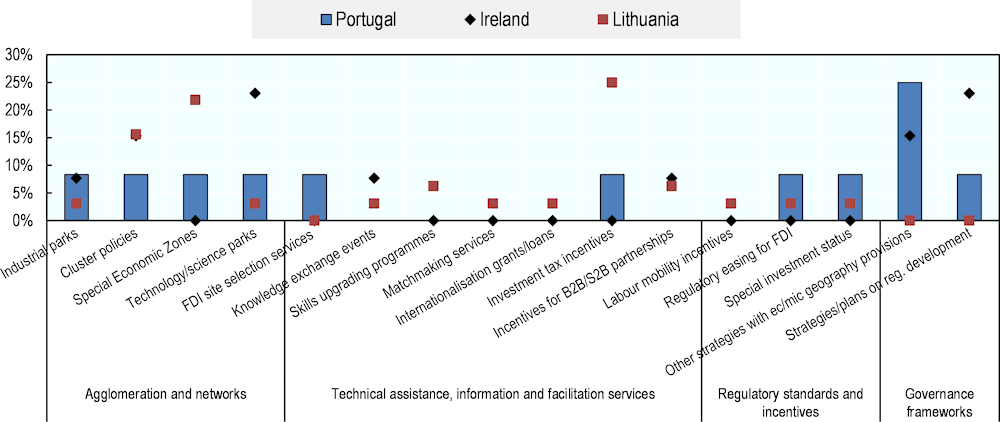
Source: EU/OECD Survey on Policies enabling FDI spillovers to domestic SMEs (2021).
Figure 5.15. Place-based targeting of FDI-SME diffusion policies
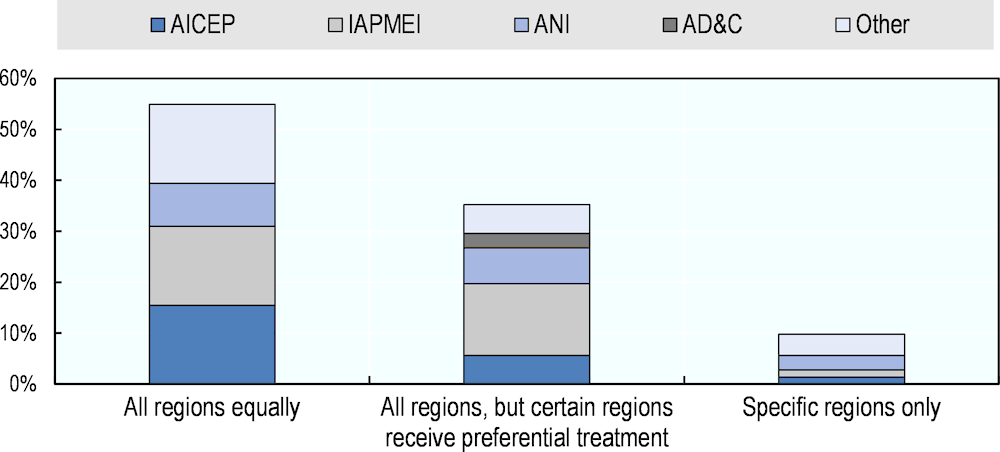
Note: The Autonomous Regions of Acores and Madeira are excluded from this analysis. “All regions” refers to the NUTS 2 regions of continental Portugal. Source: EU/OECD Survey on Policies enabling FDI spillovers to domestic SMEs (2021).
Agglomeration policies are driven by geographic and sectoral priorities identified in Portugal’s smart specialisation strategy
Recent policy initiatives aimed at supporting clusters, industrial parks and business networks have been successful in mobilising the public and private sectors and providing them with the necessary technical and financial support to foster greater collaboration. Since 2017, IAPMEI has coordinated the recognition and establishment of 18 industrial clusters covering various sectors of the economy and involving companies, business associations, public institutions and non-corporate entities of the Portuguese research and innovation ecosystem. The clusters play an important role in supporting SMEs to implement smart specialisation strategies, assess bottlenecks in their performance, and provide feedback to government agencies on the implementation of effective SME policies. In 2019, several agreements (“Sectoral Pacts for Competitiveness and Internationalisation”) were signed between the Ministry of Economy and some of the recognised clusters, whereby they commit to a set of collaborative actions in line with smart specialisation, including training and skills development programmes, measures to promote industry 4.0 practices, innovation activities, and targeted reforms in the regulatory environment to address barriers to innovation and internationalisation in specific sectors and value chains (IAPMEI, 2021[18]).
AICEP is also increasingly taking into account agglomeration economies when supporting foreign firms in their FDI location decisions. AICEP Global Parques, a subsidiary of AICEP, operates three industrial parks in different locations across Portugal that both domestic and foreign firms can use to set up their business. The parks are able to host any kind of business activity, but depending on their location they tend to attract companies undertaking activities in line with the sectoral make-up of local economies. For instance, the Zils park attracts companies operating in the energy, agribusiness, logistics, technology and services sectors; the BlueBiz park focuses on office centres, aeronautics, industrial, agribusiness, logistics, and automotive sectors; while the Albiz park hosts companies operating in the industrial, logistics and services sectors. An online Site Selection Platform was also recently launched to help foreign investors find the best business location within Portugal that meets their requirements.
Portuguese cluster policies rely on sectoral considerations and priorities identified in the national and regional smart specialisation strategies. The strategies identify several priority areas that should be targeted by public action, such as the transport and environmental industries, health and life sciences, tourism, the creative and cultural sectors, ICTs, fisheries, the agro-food industry, energy, and industrial production technologies (Government of Portugal, 2014[19]). In fact, these sectoral considerations are also reflected in other policy initiatives (Figure 5.16). Many Portuguese policies focus on supporting firms in tradable sectors that are exposed to international competition, while pre-production activities such as basic and applied R&D receive increased policy attention. For instance, the EU-funded Portugal 2020 incentive schemes are open to firms operating in all economic activities with the exception of financial services, the defence sector and betting games. However, only investments aimed at the production of tradable goods and services can receive financial support, a condition assessed on the basis of several criteria including the amount of direct and indirect exports in a given sector, the provision of services to non-residents, as well as the degree of import substitution observed in a given sector over time. In the case of investment tax incentives, mostly firms operating in the agricultural, industrial, and commercial and services sectors can benefit from tax relief for their investments, although certain tax schemes (e.g. RFAI, Contractual Tax Benefits) apply to a wider range of sectors.
Figure 5.16. Sector-specific versus sector-neutral policies

Note: The following value chain activities are considered: i) Pre-production services: R&D, concept development, design, patents; ii) Low and medium-technology manufacturing: production of simple, relatively unsophisticated goods such as basic metals, plastic products, food, textiles, etc; iii) High-technology manufacturing: production of highly specialised, technologically sophisticated goods such as computer and electronic products, pharmaceuticals, chemicals, medical products, etc; iv) Post-production services: marketing, sales, logistics, brand management, distribution and customer services.
Source: EU/OECD Survey on Policies enabling FDI spillovers to domestic SMEs (2021).
5.4. Key policies acting upon FDI-SME diffusion channels
Promoting FDI-SME linkages and strategic partnerships
Matchmaking services and financial incentives for R&D collaboration dominate the policy mix for value chain linkages and strategic partnerships
Portugal has a comprehensive policy framework to foster collaboration between foreign firms and domestic SMEs (Figure 5.17; Table 5.3). As part of its aftercare services, AICEP implements two programmes that help foreign investors identify local suppliers, targeting traditional SMEs as well as young innovative start-ups. Several matchmaking platforms and local supplier databases are also in place to bring down information barriers and allow foreign and domestic firms to identify local sourcing and partnership opportunities. For instance, AICEP has developed a new platform, which relies on AI technology to deliver customised matchmaking services, while ANI operates the Business and Technology Exchange platform, which serves as a single access point for Portuguese technology offers and requests.
The Suppliers Clubs programme, which is AICEP’s flagship initiative for the integration of Portuguese companies into global value chains, has been successful in mobilising a variety of public and private actors and delivering a package of support services to help local SMEs collaborate with foreign affiliates. The programme combines matchmaking services to help foreign and domestic firms identify collaboration opportunities and agree on jointly-implemented projects; business consulting and training programmes provided by foreign affiliates to their suppliers based on an assessment of their performance; and financial support through the Portugal 2020 incentive schemes to help SMEs upgrade their technological capabilities and respond to the needs of foreign firms. Such a comprehensive approach to supply chain development can help SMEs increase their chances of becoming partners and suppliers of foreign firms.
Many trade promotion policies provided by IPAs and SME agencies are also important for enabling SMEs to acquire new skills and upgrade their capabilities in various aspects of their performance – management, production, sales, innovation – and provide coaching and training in quality control and product certification. AICEP’s Internationalisation Academy offers training programmes and online courses developed in partnership with Portuguese universities and business schools to help companies acquire knowledge of certification standards and processes. An Online Exports Programme also provides tailored consulting services on issues related to e-commerce and digital transformation. Financial incentives for internationalisation activities are another type of support that Portuguese SMEs can receive. For instance the SME Internationalisation vouchers and grants help SMEs acquire consulting services from international market experts and receive technical assistance for the implementation of export-oriented projects, including product certification.
Regarding strategic partnerships, the Portugal 2020 Incentives System for Research and Technological Development (SI I&DT) supports industrial research and experimental development activities implemented in partnership between companies or between companies and non-corporate entities of the Portuguese research and innovation ecosystem. ANI is responsible for the management and evaluation of applications submitted for these schemes, which cover various collaborative activities. For instance, the Co-promotion R&D Centres incentive provides financial support to a group of companies and non-corporate entities, who are led by an SME and aim to jointly develop innovative products, conduct technological feasibility studies, and share resources on the basis of a shared activity plan. Similarly, several other financial support schemes such as the Mobiliser Programme and the Enterprise R&D incentive provide higher co-financing rates when R&D activities are undertaken in a collaborative way among various companies.
However, financial incentives for R&D collaborations do not necessarily always involve foreign affiliates and their scope can be limited to collaborations between national actors only. The Suppliers Clubs programme has helped channel Portugal 2020 funding into collaborative R&D projects involving foreign affiliates and domestic firms; however more could be done to broaden their use for FDI-SME partnerships as well as partnerships between foreign affiliates and domestic R&D institutions. ANI, as the main agency responsible for collaborative R&D incentives, could encourage R&D-intensive foreign affiliates that do not participate in a Suppliers Club to engage in collaborative projects by prioritising their selection as recipients of financial support. Moreover, the success of the Suppliers Clubs programme could be further consolidated with the establishment of additional FDI-SME supplier networks in sectors of strategic importance for the Portuguese economy. Due consideration should be also given to monitoring the impact of the programme in the longer term to assess whether SMEs continue to benefit from supply chain linkages after the end of each project implementation cycle. The alignment of SME capacities with the needs of foreign investors will ensure that supplier networks are maintained after public support is phased out.
Figure 5.17. Policy instruments for value chain linkages and strategic partnerships
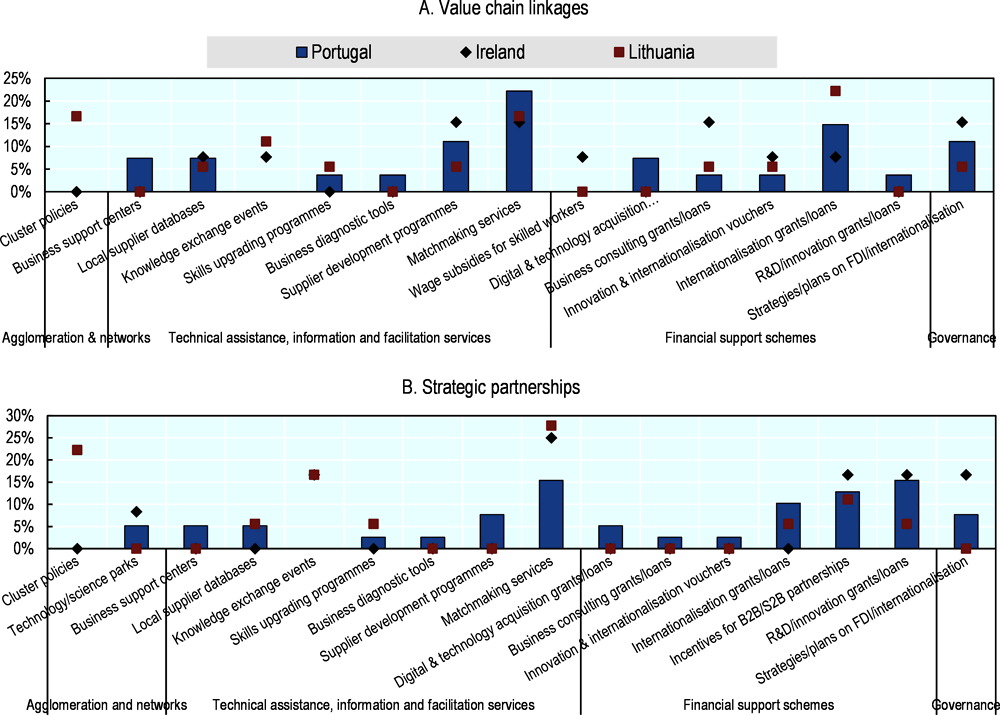
Source: EU/OECD Survey on Policies enabling FDI spillovers to domestic SMEs (2021).
Table 5.3. Main policies for value chain linkages and strategic partnerships
|
Main policies |
Description |
Implementing institution |
|---|---|---|
|
Suppliers Network – Sourcing in Portugal Initiative |
It involves B2B meetings and short business trips during which foreign investors meet Portuguese suppliers to evaluate the potential of their products and services and explore opportunities for collaboration. |
AICEP |
|
Startups Connecting Links programme |
It introduces Portuguese startups to foreign multinationals and promote the products and services of young innovative firms with potential for growth. |
AICEP |
|
National Manufacturers Catalogue |
IAPMEI maintains a National Manufacturers Catalogue, which contains information on products manufactured by Portuguese companies across different sectors |
IAPMEI |
|
Business Matchmaking platform |
AICEP is currently developing a new Business Matchmaking platform, which will rely on AI technology, including machine learning and big data, to deliver customised services to companies, including matching with investors, information on potential partners and internationalisation plans. |
AICEP |
|
Business and Technology Exchange platform |
ANI operates a Business and Technology Exchange platform, which serves as a single access point for Portuguese technology offers and requests, allowing companies to receive information on collaborative R&D projects and identify opportunities for business partnerships. |
ANI |
|
Suppliers Clubs |
Groups of Portuguese suppliers collaborate with foreign multinationals and other non-corporate entities of the Portuguese research and innovation ecosystem for the development of new products, services and technologies |
AICEP, IAPMEI, ANI |
|
Internationalisation Academy |
AICEP’s Internationalisation Academy offers training programmes and online courses developed in partnership with Portuguese universities and business schools to help companies diversify the markets in which they operate and acquire knowledge of certification standards and processes |
AICEP |
|
Export Offices |
They are jointly operated by AICEP and IAPMEI in 10 different locations across Portugal, and provide information on available training programmes and help SMEs build business networks and approach foreign firms in domestic and international markets. |
IAPMEI, AICEP |
|
PT2020 SME Qualification and Internationalisation Incentives |
The Portugal 2020 Incentives System for SME Qualification and Internationalisation includes a set of financial incentives to support companies in the development and promotion of their brand, the expansion of their business activities to international markets, the certification of products based on international standards, the setup of e-commerce platforms, and the introduction of new organisational and commercial business models |
AICEP, IAPMEI |
|
PT2020 R&D Collaboration Incentives |
The Portugal 2020 Incentives System for Research and Technological Development (SI I&DT) supports industrial research and experimental development activities implemented in partnership between companies or between companies and non-corporate entities of the Portuguese research and innovation ecosystem |
AICEP, ANI |
Source: EU/OECD Survey on Policies enabling FDI spillovers to domestic SMEs (2021).
Facilitating the mobility of workers from foreign MNEs to the domestic entrepreneurial ecosystem
Productivity spillovers from labour mobility depend on the quality of labour market regulations and the availability of policies and programmes that encourage workers to move from foreign firms to the domestic entrepreneurial ecosystem. Striking the right balance between employment protection and adaptable labour markets, while incentivising the mobility of skilled workers in sectors with considerable FDI presence through targeted measures can contribute to greater spillovers on local economies.
Portugal’s stringent employment protection regulations may hinder labour mobility in sectors and regions with low SME absorptive capacities
According to the OECD indicators of Employment Protection Legislation (EPL), in Portugal, rules for individual and collective dismissals of regular workers are significantly stricter than the OECD average (Figure 5.18). The regulatory setting for hiring temporary workers is, however, less strict than the rules for regular workers, but still significantly above the OECD average. Limits on dismissals can contribute to maintaining incomes in times of economic crisis, but overly restrictive regulations can reduce firms’ survival chances. Restrictions in the hiring and firing of workers may also discourage Portuguese SMEs, which cannot easily match the wage rates of larger –often foreign– firms, from offering employment to highly skilled workers. As seen in Portugal and other EU countries (e.g. Netherlands, Sweden) relatively low regulation of temporary contracts in situations of high regulation of regular contracts can lead to strong labour market segmentation between highly protected regular workers and weakly protected temporary workers (OECD, 2014[20]). This dualism has deterred many employers from offering permanent contracts, leading to Portugal having one of the highest shares of workers on temporary employment in the EU (20.4% in Q2 2019, well above the EU average of 12.6%) (European Commission, 2020[21]).
Figure 5.18. Portugal has stricter regulations on employment protection than other OECD countries
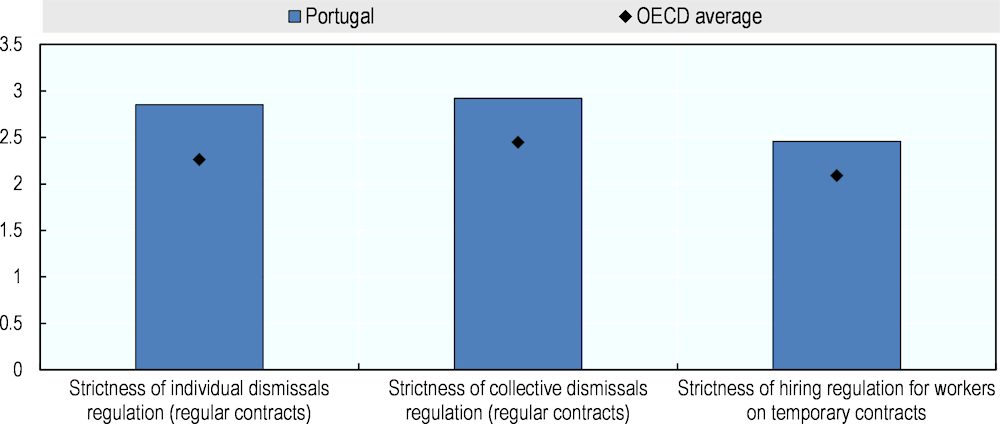
Note: The OECD indicators of employment protection are synthetic indicators of the strictness of regulation on dismissals and the use of temporary contracts. For each year, indicators refer to regulation in force on the 1st of January. Range of indicator scores: from 0 (low regulatory protection) to 6 (high regulatory protection).
Source: OECD Employment Protection Legislation Database, 2019
The overall restrictiveness of the Portuguese labour market policy regime points towards potential weaknesses in the diffusion of productivity and innovation through labour mobility, in particular in regions and sectors with low absorptive capacities. Recent evidence from EU countries shows that the benefits for a local economy from FDI are lowest where there exist a combination of stringent employment protection legislation and low absorptive capacity of domestic firms (Becker et al., 2020[22]). This is because foreign firms seek to attract local talent by offering higher wages that domestic firms with low absorptive capacity are unable to match. Increased wage disparities coupled with rigid labour market conditions limit the ability of domestic firms to retain and attract skilled workers, leading to a significant crowding out effect that holds back labour mobility towards domestic firms.
Strict dismissal regulations may also affect Portuguese firms’ incentive to invest in the human capital of their employees, which is an important component of a firm’s absorptive capacity. Evidence on the impact of employment protection regulations on job training decisions shows that enforcing overly restrictive dismissal regulations combined with lower regulation of temporary contracts (as is the case in Portugal) may lead to reduced investment by firms on improving the skills of their employees (Almeida and Aterido, 2011[23]). This is mainly due to the increased firing costs that firms have to face and the relative ease of offering temporary employment, which does not involve long-term skills enhancement opportunities. Recent labour policies in Portugal have focused on disincentivising the use of temporary contracts. The 2019 labour market reform reduced the maximum duration of temporary contracts from 3 to 2 years and introduced a requirement for firms to justify their use. The Contrato-Geração measure was also implemented with the aim to promote permanent employment for both first-time jobseekers and the long-term unemployed (European Commission, 2020[21]). These measures have not, however, addressed the overall restrictiveness of the regulatory framework.
In line with recommendations from the 2021 OECD Economic Survey of Portugal, the government should consider reforming certain labour market rules to strike the right balance between employment protection and adaptable labour markets – for instance, by allowing dismissals for performance-related reasons while maintaining strong protection against arbitrary dismissals (OECD, 2020[24]; OECD, 2021[10]). Labour market regulations and their role in FDI-SME diffusion should be also considered in the context of other drivers of labour mobility, including the absorptive capacity of domestic SMEs and the availability (or lack) of skills in the local labour force (see section on SME absorptive capacities). Portuguese SMEs will also need to have access to technical and financial support to provide on-the-job training to their employees. Measures that strengthen their competitiveness and productivity can help them compete effectively with foreign affiliates, offer better wages and attract highly skilled workers.
The labour mobility channel receives less policy attention in the overall policy mix
The main Portuguese government agencies do not implement many targeted policies that could contribute to greater labour mobility between foreign and domestic firms. In fact, this is not unusual among EU Member States. Preliminary findings from the OECD/EU Survey on Policies enabling FDI spillovers to domestic SMEs show that the labour mobility channel receives less attention from policymakers. In many EU countries, labour mobility schemes are linked to broader skill development strategies that aim to reduce skill mismatches and shortages in sectors where FDI activity is concentrated.
AICEP implements the INOV Contacto programme, which allows highly-skilled young graduates to conduct a short-term internship in a Portuguese company, followed by a long-term internship in a foreign multinational (Box 5.2). Since its launch in 1997, the programme has involved more than 1280 Portuguese and foreign firms and close to 6000 young employees. In the Slovak Republic, a similar internship programme for entrepreneurs is implemented by the Slovak Business Agency (SBA) whereby SME employees and individual entrepreneurs spend three months in a foreign firm, business incubator or technology park and receive counselling services from foreign experts and mentors. Although these policies do not affect the overall labour market conditions, they can provide a more targeted approach to facilitating the transfer of knowledge and skills to local labour markets.
Box 5.2. Labour mobility schemes involving foreign and domestic firms in Portugal and Slovakia
INOV Contacto programme (Portugal)
INOV Contacto is an international professional internship programme managed by AICEP that places highly qualified graduates in foreign multinationals and Portuguese firms with offices abroad for a period of 6-9 months. The programme aims to support the internationalisation of Portuguese firms through the integration of highly skilled employees in their workforce and foster links between local firms and foreign multinational companies through labour mobility. The programme is structured in three distinct parts: 1) a startup one-week course on international management; ii) short-term internship in a Portuguese company; iii) long-term internship in a multinational company abroad. Since its establishment in 1997, the programme has sent more than 5000 young professionals to work as interns in Portuguese and foreign multinational companies, allowing them to sharpen their skills in an international environment while contributing to the transfer of knowledge and skills to the Portuguese labour market.
Internship programme (Slovak Republic)
The Slovak Business Agency’s (SBA) Internship Programme is designed to assist innovative companies and aspiring entrepreneurs to obtain experience in doing business in foreign markets via counselling services from foreign experts and mentors. The target group of support included companies established 3 years before at the latest (sole traders, limited liability companies, joint-stock companies) in various areas. The programme supports three types of ‘internship’: i) a three month stay in a business incubator, foreign firm or technology park in Israel, Singapore or the United States; ii) one week of training in the agency’s National Business Centre (NBA) followed by one month abroad in another EU country; or a 5-day stay at an international conference or workshop in another EU country.
Source: EU/OECD Survey on Policies enabling FDI spillovers to domestic SMEs (2021).
Linked to domestic labour mobility schemes is the increasing number of policies adopted by OECD governments to facilitate immigration of business talent as a way to help domestic economies become more innovative and fulfil the skill needs of foreign investors. In Portugal, IAPMEI is responsible for the Tech Visa programme, which is addressed to companies that wish to attract highly qualified employees from outside of the EU’s Schengen Zone. Only companies that demonstrate strong technological capabilities and market potential in knowledge intensive and high-technology sectors can benefit from the programme. The impact of these schemes on the productivity and innovation of domestic economies is not clear, but other factors such as labour market conditions, the presence of a thriving startup ecosystem, and the quality of the business environment are thought to be key determinants.
Portugal could build on the success of the INOV Contacto programme and broaden the range of policies available to encourage labour mobility between foreign and domestic firms. Incentives for corporate spin-outs could allow large firm employees, including foreign affiliates, to create their own company. Payroll tax incentives for highly-skilled or R&D workers could also encourage domestic SMEs to hire qualified employees with prior experience in multinational firms.
Creating market conditions for fair competition and knowledge exchange between foreign MNEs and local SMEs
Competition rules that ensure a level playing field for foreign and domestic firms can facilitate the entry of foreign investors and, at the same time, incentivise domestic firms to become more productive, innovate and improve the quality of their products (Lembcke and Wildnerova, 2020[25]). Policies that ensure intellectual property (IP) rights protection are also important as they guarantee the appropriability of knowledge and innovation benefits, and determine the qualities of FDI that can be attracted.
Certain product market regulations could be further streamlined to improve competition
According to the OECD Product Market Regulation (PMR) indicators, which measure the degree to which laws and policies promote or inhibit competition, regulatory barriers to competition are on par with the OECD and EU averages (Figure 5.19). Public ownership and administrative requirements on start-ups are limited while the licensing regime is very lean. Businesses can be informed about all licences and issue them through a dedicated one-stop-shop, and a ‘silence is consent’ rule is applied, which reduces waiting time for licence approvals. The legal framework for public procurement of goods and services is also aligned with OECD good practices. For instance, contracting authorities are obliged to make all tender documents available online and free of charge, and facilitate online tender submissions by all firms (OECD, 2018[26]).
Figure 5.19. More pro-competitive regulation is needed in certain areas
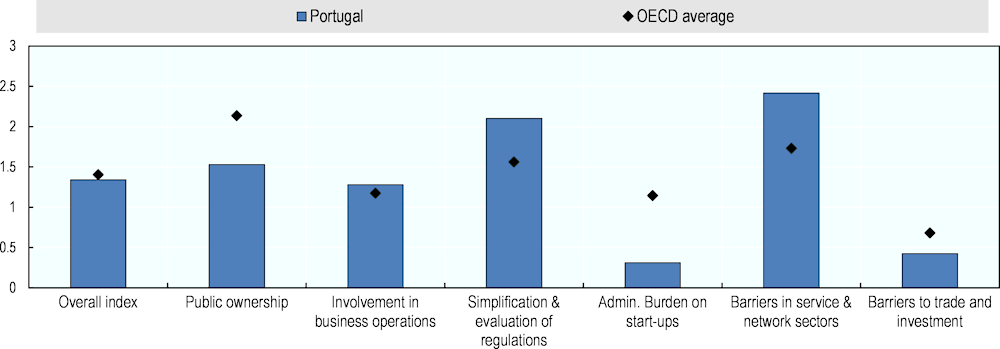
Note: The indicators refer to economy-wide regulation and are composed of the simple average of the sub-indicators on State involvement and Barriers to entry. The indicators range between 0 (most competitive) and 6 (least competitive environment).
Source: OECD PMR database, 2018.
Despite reform efforts, Portugal’s PMR score indicates that there is scope to further improve its performance in the area of simplification and evaluation of regulations. The quality of public services and coherence and transparency of regulations are factors that significantly influence competition and the investment climate more broadly (OECD, 2015[27]). Several reforms have been introduced in Portugal to reduce administrative burdens for business. This included the elimination of licensing surcharges levied by municipalities, the consolidation of environmental licences, and the implementation of the Zero Authorisation initiative, which replaced various formal authorisation procedures with business making a declaration via an e-government portal. The Simplex+ Programme was also launched in 2016 aiming to simplify laws and regulations and de-bureaucratise public services (OECD, 2019[12]). It continued efforts made by the Simplex programme (2006-11) and the Simplificar programme (2014), which focused on administrative simplification and e-government. Recent policy initiatives have increasingly focused on promoting the use of digital solutions for the simplification of public administration procedures and rules. The 2020 Action Plan for Digital Transition (Plano de Ação para a Transição Digital) puts forward a set of measures aiming at the digitalisation of the public administration, including the digitisation of 25 public services most used by citizens and companies and the simplification of public procurement rules. Additional measures on administrative simplification have been also included in the Strategy for Innovation and Modernisation of the State and Public Administration 2020-2023 (Estratégia para a Inovação e Modernização do Estado e da Administração Pública 2020-2023) (Government of Portugal, 2020[28]).
At the sectoral level, professional services (e.g. lawyers, accountants, civil engineers, etc.) and the retail sector face considerable barriers to entry and conduct restraints (Figure 5.20). Although these sectors are not FDI-intensive and therefore less relevant for FDI spillovers, they can still affect foreign affiliates’ business operations in downstream sectors. When firms are subject to overly restrictive entry restrictions and onerous rules for conducting their business, a lack of competitive pressure may induce them to charge above-market prices, provide sub-optimal services and fail to adapt to market changes and innovation. The regulatory burden on these sectors could be eased by removing burdensome registration and licensing rules. These reforms are already included in the recently agreed Resilience and Recovery Plan, whereby the Portuguese government commits to streamlining the regulatory environment and removing any competition-distorting rules for highly regulated professions (Government of Portugal, 2021[13]).
Figure 5.20. Retail trade and professional services are heavily regulated
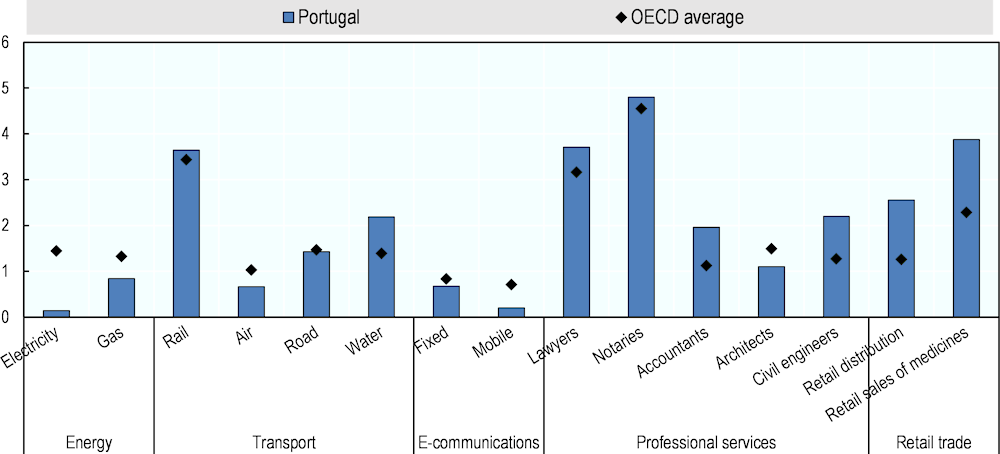
Note: Index scale 0 to 6 from most to least competition-friendly regulation.
Source: OECD 2018 PMR database
Portugal has a strong legal framework for intellectual property protection
Portugal has an extensive legal framework for IP rights protection that complies with European and international standards. It ranks 32nd out of 141 countries in terms of IP protection in the World Economic Forum’s 2019 Competitiveness Report, and 31st out of 131 economies in the Global Innovation Index 2020 prepared by the World Intellectual Property Organisation (WIPO), INSEAD and Cornell University (World Economic Forum, 2019[29]; Cornell University, INSEAD, and WIPO, 2020[30]).
The registration of IP rights is done through the National Industrial Property Institute (INPI), which operates under the Portuguese Ministry of Justice. INPI organises seminars and training programmes through its Industrial Property Academy to help businesses, in particular SMEs, familiarise themselves with IP rights protection tools and processes, and makes available templates that Portuguese firms can use for technology transfer and R&D agreements. A set of financial support schemes is also available under the Portugal 2020 Incentives System for Research and Technological Development (SI I&DT) to help SMEs register their inventions, industrial designs and trademarks in Portugal and abroad.
The main legal instrument for the protection of IP rights is the Industrial Property Code (IPC), which was introduced in 2003 and covers several categories of IP rights, namely patents, utility models, trademarks, industrial designs, designations of origin and geographical indications. Over the years, the IPC has been amended and harmonised with that of other EU countries through several legal acts that incorporated EU directives on areas such as the protection of biotechnological inventions, the protection of designs, trademarks and trade secrets and the creation of supplementary protection certificates for certain products.
The enforcement of IP rights and the settlement of disputes have also significantly improved since the establishment of a specialised Intellectual Property Court in 2012. The court has jurisdiction to rule on all matters relating to industrial property rights and has contributed to more efficient litigation processes. Prior to its establishment, considerable delays in the procedural stages and decision of cases involving the enforcement of IP rights were observed in Portugal due to the backlogs of cases piled up on the calendars of civil courts (Andrade, 2015[31]). Disputes may be also settled through alternative dispute resolution such as mediation or arbitration before bringing a case before the Portuguese courts. The Arbitration Tribunal (ARBITRARE), is a state-supported arbitration centre for mediation and arbitration, which has jurisdiction to resolve solely disputes relating to industrial property between private parties and between applicants and the INPI.
The enforcement of IP rights has been further addressed since a dedicated Task Force was created to combat counterfeiting. The Anti-Counterfeiting Group aims to foster inter-institutional cooperation and strengthen the mechanisms available to address infringements of industrial property rights. The group also aims to raise awareness on IP rights, exchange statistical information on the seizure of counterfeit products and reflect on the quality of the national legal framework. The creation of specialised structures for combatting counterfeiting is common among EU Member States.
Demonstration and knowledge exchange events targeting foreign affiliates and domestic SMEs could be leveraged further to strengthen imitation effects
The organisation of networking and knowledge exchange events is a common practice among government agencies responsible for investment promotion, SME and innovation policies. For instance, Enterprise Ireland, the Irish SME agency, organises Best Practice Study Visits that allow Irish firms to visit the manufacturing plants of foreign firms and get first-hand experience on their business practices and processes.
Similarly in Portugal, IAPMEI implements the Open Days i4.0 initiative which aims to present the technological capabilities of innovative companies during stakeholder events and promote the sharing of experiences between market actors operating in the same value chains. These public events include, in addition to moments of networking and information sharing, visits to the most advanced industrial plants in Portugal, presentations of innovative technologies, exhibitions of technology products and hands-on discussions between business representatives and other market stakeholders. The initiative is one of the measures of the Industry 4.0 Programme. Best practice demonstration events are also supported through the Portugal 2020 Incentives System for Research and Technological Development. Financial support is available to companies that want to present the outcome of their R&D activities. The public character of these demonstration actions must always be ensured for financial support to be granted.
References
[23] Almeida, R. and R. Aterido (2011), “On-the-job training and rigidity of employment protection in the developing world: Evidence from differential enforcement”, Labour Economics, Vol. 18, pp. S71-S82, http://dx.doi.org/10.1016/j.labeco.2011.05.001.
[31] Baechtold, R. (ed.) (2015), Portugal, Law Business Research Ltd, https://www.vda.pt/xms/files/v1/Publicacoes/2015/The_Intellectual_Property_Review_-_Portugal_Chapter.pdf.
[22] Becker, B. et al. (2020), “FDI in hot labour markets: The implications of the war for talent”, Journal of International Business Policy (2020), pp. 107–133.
[30] Cornell University, INSEAD, and WIPO (2020), The Global Innovation Index 2020: Who Will Finance Innovation?, https://www.wipo.int/edocs/pubdocs/en/wipo_pub_gii_2020.pdf.
[21] European Commission (2020), Country Report Portugal 2020, https://eur-lex.europa.eu/legal-content/EN/TXT/PDF/?uri=CELEX:52020SC0521&from=EN.
[11] European Commission (2020), The 2020 EU Justice Scoreboard, Luxembourg: Publications Office of the European Union, https://ec.europa.eu/info/sites/default/files/justice_scoreboard_2020_en.pdf.
[8] European Commission (2019), 2019 SBA Fact Sheet & Scoreboard, https://ec.europa.eu/docsroom/documents/38662/attachments/1/translations/en/renditions/native.
[7] Farole, T. and D. Winkler (eds.) (2014), Making Foreign Direct Investment Work for Sub-Saharan Africa:Local Spillovers and Competitiveness in Global Value Chains, The World Bank, http://dx.doi.org/10.1596/978-1-4648-0126-6.
[13] Government of Portugal (2021), Recovery and Resilience Plan, Ministerio do Planeamento, https://dados.gov.pt/s/resources/documentacao-do-prr/20210502-190055/43-20210421-prr-finalcom.pdf.
[28] Government of Portugal (2020), Estratégia para a Inovação e Modernização do Estado e da Administração Pública 2020 -2023, https://www.portugal.gov.pt/download-ficheiros/ficheiro.aspx?v=%3d%3dBQAAAB%2bLCAAAAAAABAAzNDCyNAcAwYeeOwUAAAA%3d.
[15] Government of Portugal (2017), Portugal INCoDe.2030, Iniciativa Nacional Competências Digitais, 2030, http://www.incode2030.gov.pt/sites/default/files/incode2030_en.pdf (accessed on 11 March 2021).
[4] Government of Portugal (2014), Decree-Law No. 138/2014 of 15 September, https://dre.pt/pesquisa/-/search/56819089/details/maximized.
[19] Government of Portugal (2014), Estratégia de Investigação e Inovação para uma Especialização Inteligente (EI&I), https://www.compete2020.gov.pt/admin/images/RIS3_Nacional_ENEI_Especializacao-Inteligente.pdf.
[18] IAPMEI (2021), Clusters de Competitividade: Pactos para a competitividade e internacionalização, https://www.iapmei.pt/getattachment/PRODUTOS-E-SERVICOS/Empreendedorismo-Inovacao/Eficiencia-Coletiva-e-Clusters/BrochuraClusters04052021.pdf.aspx.
[25] Lembcke, A. and L. Wildnerova (2020), “Does FDI benefit incumbent SMEs?: FDI spillovers and competition effects at the local level”, OECD Regional Development Working Papers, No. 2020/02, OECD Publishing, Paris, https://dx.doi.org/10.1787/47763241-en.
[2] Meissner, D. and S. Kergroach (2019), “Innovation policy mix: mapping and measurement”, The Journal of Technology Transfer, Vol. 46/1, pp. 197-222, http://dx.doi.org/10.1007/s10961-019-09767-4.
[10] OECD (2021), OECD Economic Surveys: Portugal 2021, OECD Publishing, Paris, https://dx.doi.org/10.1787/13b842d6-en.
[9] OECD (2020), Financing SMEs and Entrepreneurs 2020: An OECD Scoreboard, OECD Publishing, Paris, https://dx.doi.org/10.1787/061fe03d-en.
[24] OECD (2020), OECD Employment Outlook 2020: Worker Security and the COVID-19 Crisis, OECD Publishing, Paris, https://dx.doi.org/10.1787/1686c758-en.
[6] OECD (2020), OECD R&D tax incentives database, 2020 edition, http://www.oecd.org/sti/rd-tax-stats-database.pdf.
[16] OECD (2020), Strengthening the Governance of Skills Systems: Lessons from Six OECD Countries, OECD Skills Studies, OECD Publishing, Paris, https://dx.doi.org/10.1787/3a4bb6ea-en.
[12] OECD (2019), OECD Economic Surveys: Portugal 2019, OECD Publishing, Paris, https://dx.doi.org/10.1787/eco_surveys-prt-2019-en.
[17] OECD (2019), OECD Review of Higher Education, Research and Innovation: Portugal, OECD Publishing, Paris, https://dx.doi.org/10.1787/9789264308138-en.
[5] OECD (2019), Services Trade Restrictiveness Index (STRI): Portugal 2019, http://www.oecd.org/trade/topics/services-trade/documents/oecd-stri-country-note-portugal.pdf.
[1] OECD (2018), Mapping of Investment Promotion Agencies in OECD Countries, http://www.oecd.org/investment/Mapping-of-Investment-Promotion-Agencies-in-OECD-Countries.pdf.
[26] OECD (2018), OECD Product Market Regulation (PMR) Indicators: How does portugal compare?, https://issuu.com/oecd.publishing/docs/prt_country_note_-_tot_final.
[27] OECD (2015), Policy Framework for Investment, 2015 Edition, OECD Publishing, Paris, https://dx.doi.org/10.1787/9789264208667-en.
[20] OECD (2014), OECD Employment Outlook 2014, OECD Publishing, Paris, https://dx.doi.org/10.1787/empl_outlook-2014-en.
[14] PME Investimentos (2018), Linha Capitalizar 2018, https://www.pmeinvestimentos.pt/linhas-de-credito/linha-capitalizar-2018/.
[3] US Department of State (2020), 2020 Investment Climate Statements: Portugal, https://www.state.gov/reports/2020-investment-climate-statements/portugal/.
[29] World Economic Forum (2019), The Global Competitiveness Report, World Economic Forum, Geneva, http://www3.weforum.org/docs/WEF_TheGlobalCompetitivenessReport2019.pdf.
Note
← 1. Considering the number of policy initiatives that target certain policy objectives is only a partial measure of policy focus in a given area. One policy could rely on more resources (e.g. higher budget) for its implementation, and therefore have greater impact, while several policies in another case could be underfunded and not sufficiently effective to achieve the pursued outcomes.
